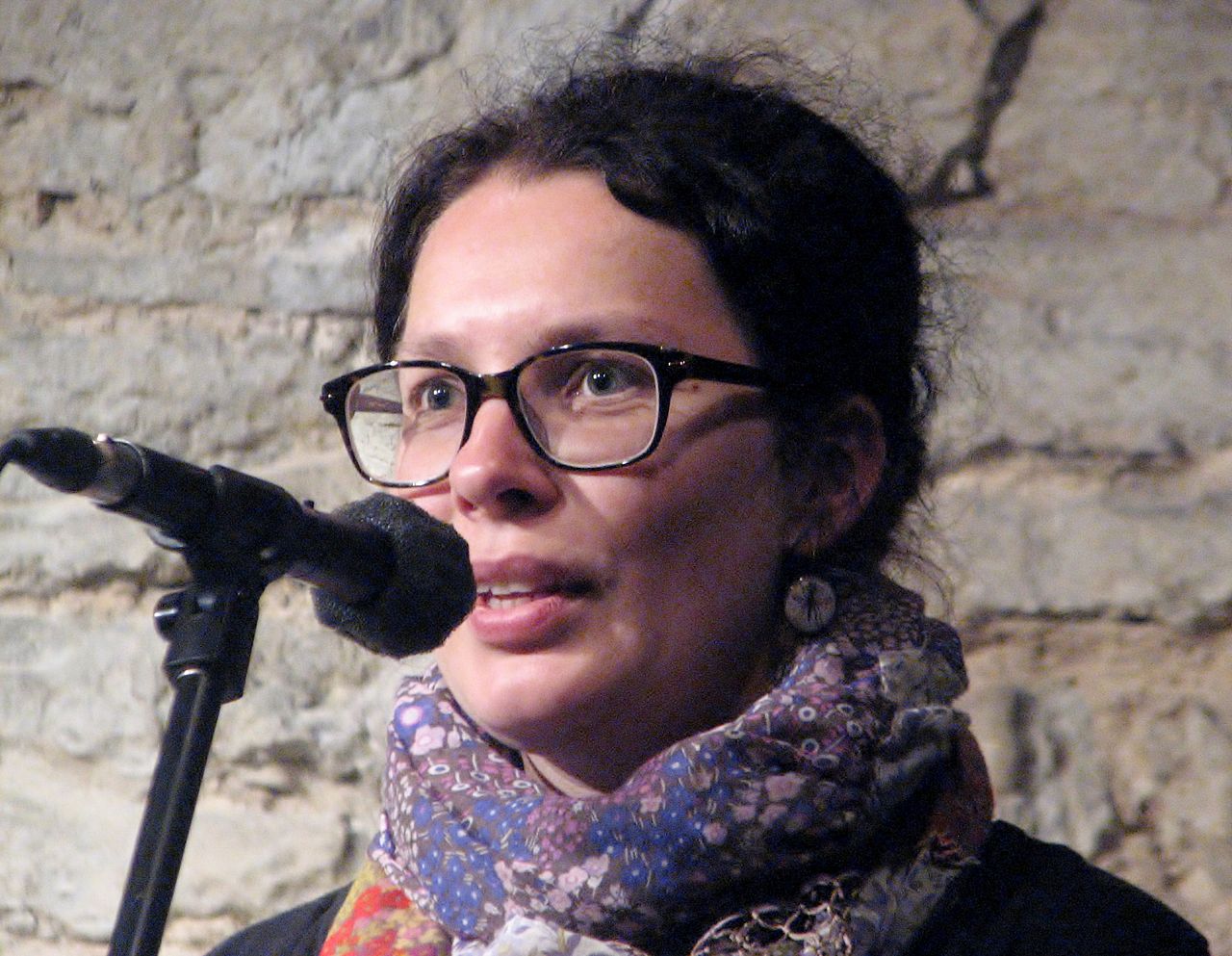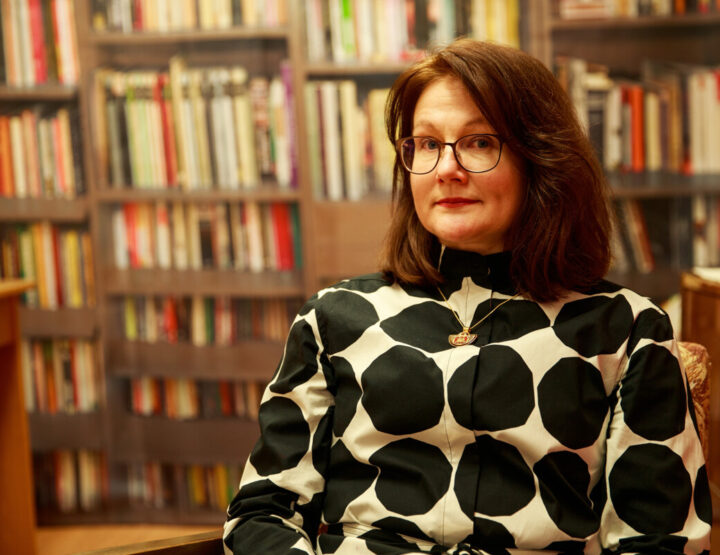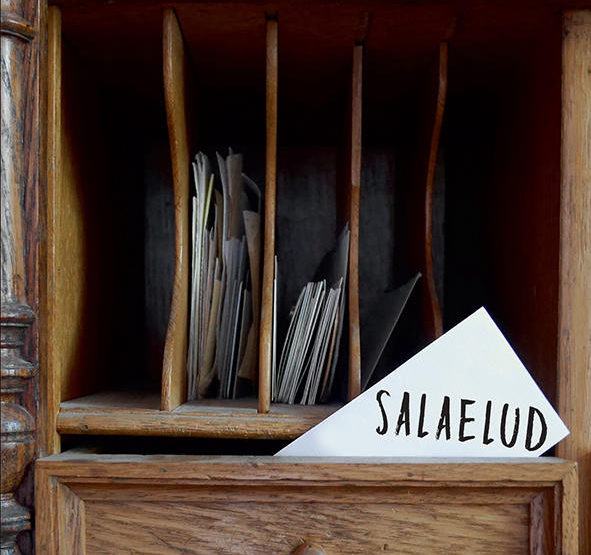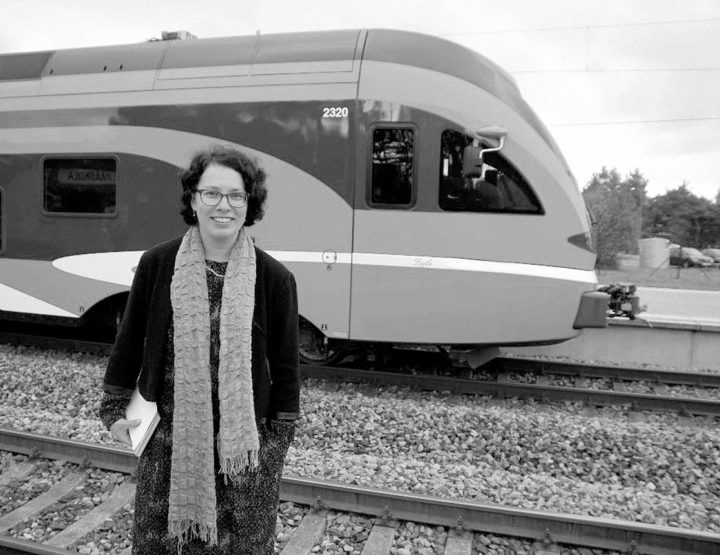Kai Aareleid’s questions for Veronika Kivisilla
For starters, perhaps tell the story of your own writing. The recognition of it, things that guided it….
Beginnings are always hard to put into words. My desire to write certainly isn’t an unwavering knowledge or instinct from childhood. I did start to read at a very young age, I spent a large portion of my time among books as a child (we had lots of them at home!), and my reports were often read aloud at school, but even so there was no “click”, no one early “piece”.
The decision to study Estonian language and literature was probably inspired most by my favorite teacher, by the support and encouragement of my Estonian-language and literature teacher Regina Peet, by her apparently seeing “something” in me, and also by realizing that nothing else interested me more. There was music, of course, but I wasn’t talented enough to study it in college. I don’t know how many high school students have a very definite vision of their future, but for me the course of things was somewhat accidental. I was also head over heels in love at the time and wasn’t even really worried about my entrance exams. But coincidences are important. I got into the Tallinn Pedagogical University [now Tallinn University – Trans.], and just look at what classmates I had: Jürgen Rooste, Ivar Sild, Jaak Urmet, Kätlin Vainola, and other writers who are now famous! And our faculty was a true powerhouse of Estonian literature and literary studies. Special bonds formed on all fronts, right away.
Back then, I hung out mostly with Jürgen and Ivar, who had already been writing before they came to university, but even so I didn’t get the feeling of wanting to start writing in their wake. I observed and listened to everything from the sidelines: they read their texts aloud all the time, of course, and their first public performances were already happening, too. The boys in our class took inspiration from the lectures and works of the Estonian poet Toomas Liiv, and that influence was mutual: after a long break, Toomas started writing again. That was beautiful. I myself was leaning more towards linguistics at the time, and to this day I feel a little guilty for maybe disappointing a few instructors. In hindsight, I realize, of course, that I’m not the academic type at all. I had to first dive into life headfirst, have two children, work as an Estonian-language teacher at a school, try my hand at writing literature textbooks, editing, translation, and book reviews, and then at a certain point in my life find myself in a phase where everything just seemed to be spinning topsy-turvy, and then, in a deep spiritual crisis, suddenly start… to write poetry… It was a stormy time, in every sense. My first book was finished and published before I could really grasp how it had all happened. It took a good long while to be able to tell myself that I was a poet. Even now, something within me occasionally resists letting me call myself a poet. But still, I understand that being a poet is a way of perceiving living and the world. In that sense, I suppose I’ve been a poet my whole life, even if I “officially” started late. If you interpret it that way, then there are many more poets around us than we realize. Some, who are poets through and through in spirit never publish a single line.
How do you write?
I only write poems when I feel like it, when there is pain or special conditions or some picture or a story or an image which condenses into a poem in my head. I’ve also written some texts on commission, although I don’t see that as the “right” thing to do. Maybe that comes from my ineptitude. I always carry a notebook in my bag: it’s a part of my standard gear when I leave home. When I forget it, which is rare, I immediately feel irritated. Even if it’s during a period when I’m not writing at all, the notebook gives me some sense of security. Walking puts my thoughts in motion. Quite a few long-sought wordings settle into place. It’s crucial that I write them down immediately, and as a result, my notebook pages are quite chaotic: I’ve written in jolting buses and in sleet storms. Sometimes, it takes a good deal of effort to later decipher a word recorded in blotted ink or scrawled handwriting.
In terms of daily rhythm, early morning is the best. It’s an energetic time when I’m most awake and effective. If a deadline is breathing down my neck, I never torture myself late at night, but rather leave the writing for the morning. I’m a big procrastinator and last-minute type, in general. It wears me out from time to time. I know that a deadline is coming closer and closer, but I’m incapable of sitting down and getting to it. I let time slip away to the final moment: I can’t even sleep then, because anxiety and worry keep me up…. I fret and I wriggle. And then, I whip everything up in a single go. That whole time my brain has merely been “simmering”. Occasionally, I’m jealous of those who are capable of maintaining a stable writing rhythm, i.e. every day from this time to that time, etc. I’m unstable, a sort of “erupter”. I erupt and then afterward I might be silent and empty for a while, just to collect and erupt once again.
In regard to writing, however, I have to mention the moments in which a text’s progression completely intoxicates me, when it brings me into an incredible, uplifting trance. Or, in some cases, an astounding sense of liberation, of relief. I’ve experienced writing’s therapeutic effect on several occasions.
Since you’ve also written prose and marginalia, how do you determine a text’s genre? Is it clear at the start?
Classifying isn’t my strongest suit. In the case of my first collection (Kallis kalender, Dear Calendar, 2011), my poems’ rap-like quality was mentioned. This came as a surprise to me, because I don’t have any close ties to rap. I suspect that I’ve acquired formal influences from oral folklore, and my background in philology probably plays a part, occasionally making me perform and relish linguistic somersaults. However, I feel closest to the world of storytelling. A longtime friend is the storyteller Piret Päär. I’ve become much richer by being around her: I know that a well-told story is the best art and gift. I appreciate the skill.
I’ve written very little prose. I hope that perhaps its path and my testing of it still lie ahead. In terms of the genre, I treasure prose poetry and short stories, which I suppose require and offer a condensed form that is similar to poetry in terms of language and content.
Generally, I don’t really ponder what one piece of writing or another should become. They take shape somehow on their own.
You mentioned storytelling. You have performed a lot as a storyteller and a singer. How is your work complemented by performance, reading your own and others’ texts, storytelling, and singing?
I love stories; I thirst for them. A story can be presented in several different ways, of course. Genuine storytelling is the absolute best, but reading aloud is important in my opinion, too. At home, I often read aloud to my kids, even though both have known how to read for a long time. It’s a mutual pleasure. When I taught at a school, I realized that oftentimes there was no other way to calm down, engross, or talk today’s restless and jittery youth into something than to tell or read them a story. That goes for my own creative activity, too. I suppose that nowadays it’s necessary for an author’s voice to literally be heard. When reading my poems at Estonian libraries, I’m glad to hear that a lively performance has hit its mark and has even spoken to the older generation, which grew up with an entirely different kind of poetry. To this day, it’s been truly hard to get them hooked on newer poetry: those who usually consider it worthless. Direct contact with an audience and their reaction when my performance touches them are beyond compare. When performing, I find that creativity and flexibility are important. A text must be perceived as a whole, and can only be claimed when it touches your soul! I don’t appreciate practiced, flawless, but lifeless performances. If there isn’t a pre-agreed program and composition, then I rarely go to perform with full knowledge of what I’m going to read exactly. I’m happy if I have the courage to just “play it as it comes along”, that the specific place and audience result in my selection of texts and the entire program. I like to read other poets’ texts along with my own. It’s a change of pace when you’re sick of your own texts, and it’s an opportunity to acknowledge an author whose works are important to you, and to introduce them to your audience as well.
Music and song… I don’t see myself as a musician at all, but music is a major and important part of me. I’ve done choral singing for 12 years, and lately have become involved in folk and early music. I cherish those forms the most. There’s not a day that goes by at home without instrument-playing, singing, improvisation, or listening to music. I feel especially free when I sing. At times, it’s even simpler and more natural than reading. At the same time, I don’t believe that every writer should necessarily take the stage to sing, dance, bang a drum, or do somersaults. Only if it’s a natural part of his or her nature. And there are more than enough multi-talented writers to go around! Sometimes, I think we really should put together some kind of a band or a choir, just like actors who sing. But it appears that a writers’ football team will be getting together first of all…
How does a poetry collection take shape?
For me, a poetry collection isn’t simply a particular number of pages or texts piled on top of one another. The emergence of my latest collection Cantus firmus was the calmest, ripest, and most thought-out for me. Three years had passed since my second book (Veronica officinalis, 2012), a decent break for collecting and letting things settle. The majority of the texts in Cantus firmus existed before the book formed as a consistent whole in my mind’s eye. It took a couple weeks of summer silence and solitude to achieve the right feeling, polish a few unfinished ideas into poems, and put together the manuscript. And then, all of a sudden, the picture came into focus, so before it went to print six months later, I changed almost nothing. I was in luck with the design once again (I think Piia Ruber’s designs of the two previous collections were also great successes). Asko Künnap marched off with an army of bark-beetles to ornament Cantus firmus. Quite honestly, I think back to the story of Cantus firmus’ development with a sense of peace and pleasure. A few moments are especially bright in my mind: such as how when Asko and I sat down to discuss the design for the first time (his second child had just been born and was sleeping in her stroller like a tiny curled-up caterpillar), we both exclaimed in unison: “Bark beetles!” And so, the bronze-colored interleaves were filled with bark-beetle labyrinths, old city blueprints, and medieval sheet music – all of which mark out paths, progressions, patterns, and arrival. It was a jubilant feeling going to pick up the first copies from the print house! My very own book, aromatic and straw-gold! Cloth-bound! I regard the book’s release as a part of the history of its creation: the first fresh, warm spring rain and a spectacularly beautiful evening in a Ukrainian church nestled behind secret walls on Laboratoorium Street in Tallinn’s Old Town. Crimean wines, homemade bread, friends, a bonfire, and great company until the early hours of the morning. I felt somehow brave sending a work born with such emotion out into the world!
Tell me about the “footnotes” in Cantus firmus. It’s a marvelous idea: telling about the ideas behind how those little stories came about.
When I was typing my poems from my notebook into the computer, I wondered what to do with the notes that I’d written next to almost every text at various times. I couldn’t bear to abandon them right away, and just for fun I initially typed them in next to the poems. And that’s where they stayed. More and more, it felt like they belonged with the texts. There were doubts, of course, about whether they might smother the poems, but I was also encouragingly advised by my friends who have editor’s eyes to leave the notes in the manuscript. Now, readers can decide for themselves whether to take the notes as independent little stories or extensions of the poems. Or to simply forego reading them.
For me, Cantus firmus (which is actually true of your texts in general) is, foremost, one big book of consolations or a book of escape routes: what consoles and redeems a person in the difficulty of existence… Minor things, actually – or major, rather, because they are eternal and… ancient? What do you say to that? How would you summarize it? What kind of feedback have you received from readers? Have you found out anything about yourself and your works that you didn’t know before? Do you receive fan mail!?
I’d like to dodge that question somehow and just say “Thanks!”, as in my awkwardness and shyness, it’s the only thing I’ve been able to say to quite a few people who have shared their experiences of reading Cantus firmus and have said good words about it. What can I say? I believe that no matter how big and important the things are that people do, we are all fundamentally similar: we all undergo very difficult periods in life from time to time, and we all seek consolation and redemption, peace and clarity. If only we were capable of noticing and understanding that an escape route is so close: it’s just that it is so normal and inconspicuous that we don’t recognize it or don’t know how to see it as something special. It’s always possible to take a situation in one way, or in a completely different way, in exhaustion or exasperation: “AGAIN, I have to cook…”. OR, RATHER, being thankful to see your child shoveling down soup, hungry after football practice. Should you swear at the dust or think: as long as there’s dust, there’s life, there’s love, there’s EVERYTHING.
A couple of readers have singled out the love poem in Cantus firmus. That surprised me, but also pleased me, because that was the one that gave me the most doubts. I was afraid it would be seen as sappy or something. However, I’ve heard that it’s not. What makes me happiest is the knowledge that something which has been very personal for me as a writer has also touched such a wide range of people. Consequently, I’ve managed to make a tiny story or part of my inner world somehow broader. Recognition is probably what I hope to find as a reader, too.
What do you regret?
I try to live without regrets. I’ve done stupid things, and awful things have happened. I’ve wasted time. I’ve crossed lines that perhaps I shouldn’t have crossed, while others have remained untouched because of ambition or cowardice. Quite a few emotional and work things have “flopped”. Yes, they certainly have. But how does it benefit me to get stuck on something gone wrong? One Estonian folk song goes: you’ll ruin your neck with regret, ruin your mind with worry…. I’d like to believe that everything that’s happened has been a part of my path and growth. Things can always get better. You can always think that perhaps that “flop” was really the best thing that could have happened. If not at the moment, then maybe sometime later, you understand the benefit of something.
Sometimes, in the evenings, when my loved ones are home safe and sound and there’s time to think back on the day and what’s happened, I list off to myself all the things that should give me cause to be thankful. And they’re not in short supply!
I’m unable to regret anything in terms of my writing, either – not a single line! Maybe I would have regretted something if I’d started writing at a very young age, but probably not. It would have been exciting, no doubt, just as it will hopefully be exciting to read this same interview after a few dozen years!
*Foto: Ave Maria Mõistlik





